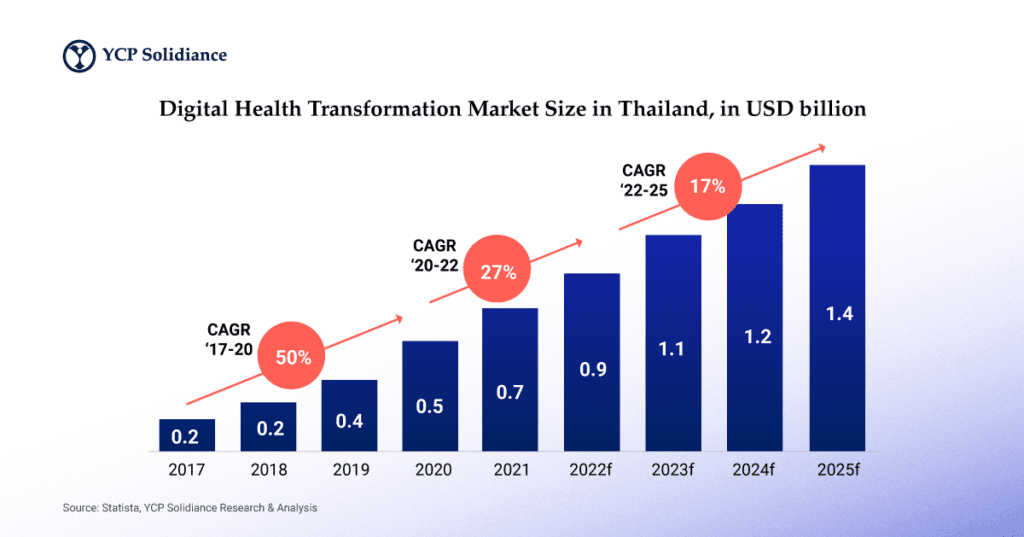Thailand’s healthcare sector has emerged as a shining example, ranking fifth in the global healthcare index and outperforming all other Southeast Asian countries. The country’s efficient healthcare system caters to medical tourists and affluent citizens through top-notch private hospitals, while also ensuring accessibility for the local population through a robust public healthcare arm. In recent years, the confluence of technological advancements, growing healthcare demand, and government support has accelerated the adoption of digital health technologies in Thailand.
The Potential of Digital Health Transformation

According to a YCP Solidiance research, the value of Thailand’s digital health transformation market is projected to reach US$1.4 billion by 2025. This remarkable growth can be attributed to the adoption of various digital health applications, including telemedicine and mobile health, which have become increasingly prevalent in the market. The surge in digital health adoption signals a significant shift towards a more connected and technologically-driven healthcare landscape in the country.
The Current State of Digital Health Adoptions

Digital health applications in Thailand are already making a positive impact on the healthcare landscape. EHR systems, telemedicine, and mobile health apps are being widely adopted, providing patients with better access to healthcare services and facilitating efficient care delivery. While telemedicine is still in its early stages in Thailand, it is gradually gaining popularity, particularly in rural regions where access to healthcare services is limited.
While there have been remarkable strides in the adoption of these technologies, there is still untapped potential for other digital health solutions, such as wearable technologies and advanced health analytics. The integration of these cutting-edge technologies can lead to a more comprehensive and seamless suite of healthcare products and services, benefiting the entire population.
Addressing Key Healthcare Challenges
Digital health transformation has emerged as a powerful solution to address key challenges in the healthcare sector:
- Inefficient Healthcare Systems: The current healthcare system faces inefficiencies, including long wait times, bureaucratic hurdles, and fragmented health data. A significant contributing factor is the continued reliance on manual or analog processes in various healthcare operations, hindering streamlined services.
- Limited Healthcare Resources: Despite growing healthcare demands, Thailand is grappling with a shortage of healthcare professionals and resources. The scarcity of medical facilities in rural areas, where approximately 80% of healthcare facilities are concentrated in major cities, further exacerbates the challenge.
- Rising Healthcare Costs: The continuously escalating cost of healthcare is a pressing concern for patients, particularly those dealing with chronic diseases that are prevalent in the country. Ensuring affordability while maintaining quality care remains a critical challenge.
Challenges in Digital Health Adoption

Despite the progress, several barriers hinder the full-scale adoption of digital health technologies in Thailand:
- Limited Healthcare Provider Adoption
While the digital health revolution is promising, it is not without its challenges. Some healthcare providers may be hesitant to adopt new technologies due to a lack of familiarity, concerns about data security, or potential disruptions to existing workflows. Addressing these concerns through comprehensive training and education is crucial to encourage widespread adoption among healthcare professionals.
- Limited Patient Awareness and Education
A significant portion of the population, particularly in rural areas, may have limited digital literacy and awareness of digital health applications. Raising awareness about the benefits of digital health solutions is essential to promote acceptance and usage among the broader population.
- Data Privacy and Security Concerns
With the digitization of healthcare data, there are legitimate concerns about data privacy and protection from cyber threats. Stricter regulations and robust security measures are needed to ensure the safety of sensitive patient information.
Future Trends Shaping Thailand’s Digital Health Landscape

Looking ahead, Thailand’s digital health transformation is poised to witness further advancements:
- Increased Collaboration: Collaboration between the Thai government and private healthcare providers is expected to foster partnerships with digital platform providers, accelerating the development of innovative digital technologies.
- Increased Investment Activities: Investment in the healthcare industry is anticipated to rise, bolstering research, development, and integration efforts.
- Integration of New Technologies: The integration of emerging digital technologies, such as wearable devices and advanced health analytics, will create a more cohesive and comprehensive suite of healthcare products and services.
Conclusion
Thailand’s journey towards digital health transformation presents immense opportunities to overcome existing challenges in healthcare and embrace a future of advanced and patient-centric medical services. With continued government support, increased collaboration, and the integration of cutting-edge technologies, Thailand is poised to lead the region in reshaping healthcare through digital innovation. As digital health continues to evolve, Thailand’s healthcare system is on the brink of an extraordinary transformation that will pave the way for a healthier and more connected society.





